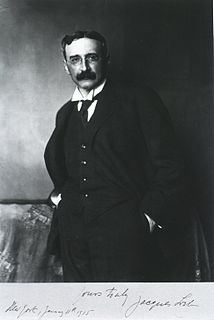A Quote by William Dean Howells
A man never sees all that his mother has been to him until it's too late to let her know that he sees it.
Related Quotes
The good enough mother, owing to her deep empathy with her infant, reflects in her face his feelings; this is why he sees himselfin her face as if in a mirror and finds himself as he sees himself in her. The not good enough mother fails to reflect the infant's feelings in her face because she is too preoccupied with her own concerns, such as her worries over whether she is doing right by her child, her anxiety that she might fail him.
Man is a megalomaniac among animals-if he sees mountains he will try to imitate them by pyramids, and if he sees some grand process like evolution, and thinks it would be at all possible for him to be in on that game, he would irreverently have to have his whack at that too. That daring megalomania of his-has it not brought him to his present place?
This is the gist of all worship: to be pure and to do good to others. He who sees Shiva in the poor, in the weak, and in the diseased, really worships Shiva. And if he sees Shiva only in the image, his worship is but preliminary. He who has served and helped one poor man seeing Shiva in him, without thinking of his caste or creed or race or anything, with him Shiva is more pleased than with the man who sees Him only in temples
No man could bring himself to reveal his true character, and, above all, his true limitations as a citizen and a Christian, his true meannesses, his true imbecilities, to his friends, or even to his wife. Honest autobiography is therefore a contradiction in terms: the moment a man considers himself, even in petto, he tries to gild and fresco himself. Thus a man's wife, however realistic her view of him, always flatters him in the end, for the worst she sees in him is appreciably better, by the time she sees it, than what is actually there.
The artist should paint not only what he sees before him, but also what he sees within him. If, however, he sees nothing within him, then he should also refrain from painting that which he sees before him. Otherwise, his pictures will be like those folding screens behind which one expects to find only the sick or the dead.
He wants her in his bedroom. And not in that way — no girl has ever been in his bedroom that way. It is his private space, his sanctuary. But he wants Clary there. He wants her to see him, the reality of him, not the image he shows the world. He wants to lie down on the bed with her and have her curl into him. He wants to hold her as she breathes softly through the night; to see her as no one else sees her: vulnerable and asleep. To see her and to be seen.
I think there's an element in Milady where she sees her own innocence in D'Artagnan. In the very beginning, she's using him in a pretty cynical way. When she gets to know him, she sees qualities in him that she recognizes and it's almost like trying to remake the past, but of course, it doesn't work.






































